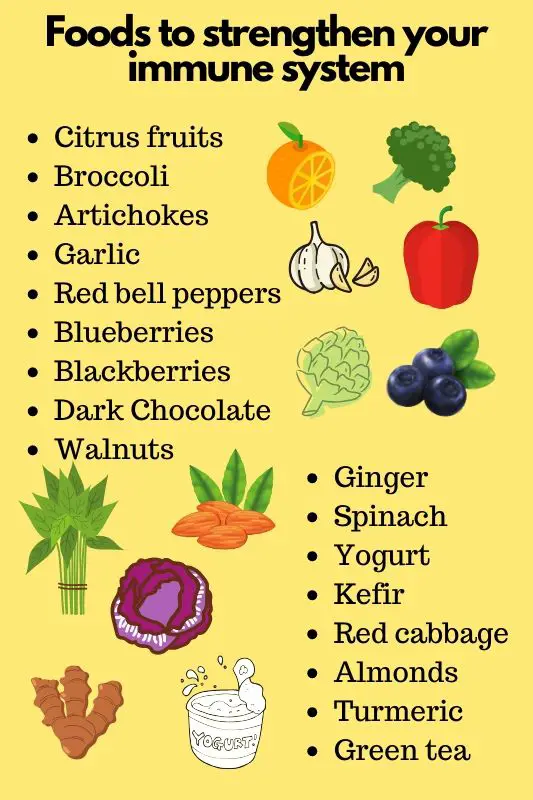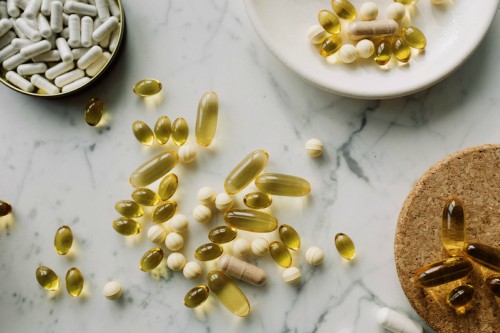Your immune system is your best ally in fighting diseases and infections, so if you are interested in knowing how to strengthen your immune system and stay healthy, I invite you to continue reading this post.
First of all, there are no magic pills or miracle recipes for having strong immunity.
Maintaining a healthy lifestyle remains paramount for optimal immune system function, even in the post-COVID era.
Prioritizing your well-being is as vital as ever, supporting your body’s natural defenses against future health challenges.
So the recommendations are still the usual ones.
Nutritious food, adequate rest, exercise, and techniques to combat anxiety and stress are the pillars you must focus on.
As you age, it becomes essential to take more care of your health.
With the years, your immune response becomes less efficient, and you are more likely to contract infectious diseases. (1)
Following this, I will briefly break down the pillars to strengthen the immune system.
How to Strengthen your Immune System: Nutritious food
You can not be too emphatic on the importance of a nutritious and balanced diet to increase your body’s defenses.
Maintaining the immune system requires consuming all the necessary vitamins, minerals, and nutrients in your diet. You find these nutrients in proteins, complex carbohydrates, and healthy fats.
It is also vitally important to avoid certain foods that cause inflammation since inflammation impairs immunity.
Among the most inflammatory foods are:
1. Sugar
2. High fructose corn syrup
3. Refined carbohydrates
4. Processed meat
5. Vegetables and seed oils
6. Artificial trans fats
7. Excessive alcohol
On the other hand, here below, I have put an image with healthy foods that you should focus on to strengthen your immune system.

How to Strengthen your Immune System: Quality of sleep
One of the factors that most weakens the immune system is not having sleep quantity and quality.
A study from the University of Tübingen (Germany) has shown how sleep improves the ability of T cells of the immune system to cope with diseases. (2)
Other scientific studies indicate that having quantity and quality of sleep has benefits such as reducing inflammation and the risk of chronic diseases.
These are the best tips to improve your quality of sleep:
1. Maintain a consistent sleep schedule
2. Avoid caffeine after 2 pm
3. Set your bedroom temperature
4. Increase bright light exposure during the day
5. Reduce blue light exposure in the evening
6. Avoid using cellphone 2 hours before going to bed
7. Eat a light dinner (at least 3 hours before bedtime)
8. Keep your bedroom dark and comfortable
How to Strengthen your Immune System: Exercise
We already know that a healthy body equals a healthy immune system.
In that sense, exercise is one of the best activities you can do for your overall health.
Exercise promotes good circulation, which helps cells and other substances in the immune system to do their jobs more efficiently.
Especially exercising in nature, at least 20 minutes a day, can strengthen the immune system and reduce cortisol levels.

How to Strengthen your Immune System: Manage stress
The relationship between body and mind is widely known.
A wide variety of illnesses are also closely related to emotional stress. (3)
Some studies indicate that the stress perceived by the organism first activates the nervous system.
Then the nervous system influences the immune system by activating hormones and neurotransmitters.
What can we do to manage stress?
- Improve the quality of your thoughts
- Practice relaxation techniques such as mindfulness and breathing exercises
- Set priorities and get organized
- Learn to delegate
- Keep a positive attitude
- Learn to connect assertively with your emotions
Supplements to strengthen the immune system
Several supplements can help strengthen the immune system and improve our body’s response to diseases.
However, I want to mention five essential supplements you need to focus on.
Zinc
Zinc is a mineral that plays a vital role in the proper functioning of the immune system and protection against inflammation.
When the body lacks this nutrient, it is more prone to infection and disease.
The recommended daily amount of zinc is 8 milligrams (mg) for women and 11 mg for adult men. The limit dose is up to 40 mg per day.
Vitamin D
Vitamin D can help strengthen the immune system and protect the respiratory tract from infections. (4)
Severe vitamin D deficiency can lead to weak bones and muscle weakness in adults. The recommended daily dose of Vitamin D is between 1,000 to 4,000 IU.
Some people with severe deficiencies of this vitamin may require higher doses.
The primary source of vitamin D is sunlight. But you can also get small amounts of vitamin D in cod liver oil, salmon, and eggs.

Vitamin C
Vitamin C is one of the most popular supplements for fighting colds and respiratory infections.
But also, vitamin C is an incredible antioxidant that helps us fight against free radicals that cause aging.
The recommended daily amount of vitamin C for adults is 65 to 90 milligrams (mg) per day, and the upper limit is 2000 mg per day.
Because it is one of the biggest promoters of the immune system, foods that contain vitamin C should not be missing from our diet.
Some foods rich in vitamin C are broccoli, spinach, strawberries, oranges, and lemon.
Vitamin B6
Vitamin B6 is essential to support biochemical reactions in the immune system.
They can also help the body to produce white blood cells, specifically T cells, which influence an efficient response to diseases.
Some people with liver or kidney problems, smokers, obese persons, alcoholics, and pregnant women may be deficient in vitamin B6.
The reference daily intake (RDI) for vitamin B6 for non-pregnant adults is 1.7 mg.
Vitamin E
Some studies suggest that vitamin E is essential in keeping the immune system healthy, especially in the elderly.
Also, Vitamin E is a powerful antioxidant that helps the body fight off infection.
The healthiest foods with the highest amounts of vitamin E are nuts, seeds, and leafy green vegetables.
The recommended dietary allowance (RDA) for vitamin E is 15 milligrams for people over 14.
Women breastfeeding may need more vitamin E, so their recommended daily dose would be 19 mg.
Remember that deficiencies in vitamins, minerals, and nutrients can disrupt the immune system.
Other essential tips for maintaining an optimal immune system are avoiding smoking, drinking alcohol in moderation, maintaining a healthy weight, and moderating caffeine consumption.
You don’t have to wait until you’re sick to boost your immune system. And without a doubt, there is much you can do now to strengthen your body’s defenses.
